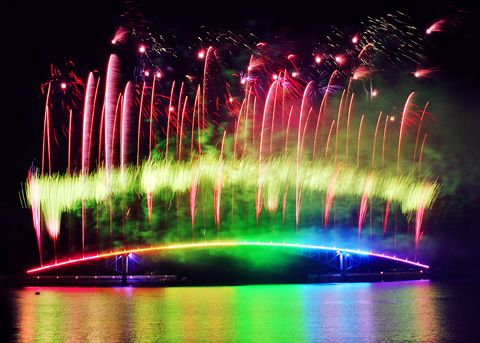Erecting a statue of a has-been celebrity’s grandmother. Scheduling an annual festival around the anniversary of a horrific airline crash. These might not sound like good ways to promote tourism, but they seem to work for Penghu.
And as far as the Penghu County Government is concerned, there’s no better way to open a program of summer activities than with fireworks. Lots of them. The Penghu Fireworks Festival (澎湖花火節) starts tomorrow night, and after that the sky above the archipelago will pulsate with explosions of color on every Wednesday and Saturday night until June 7.
The festival has been popular with locals since it began in 2003. This year, in addition to the skies over the Siying Archway Bridge (西瀛虹橋) near the main town of Makung (馬公市), there will be fireworks displays over the Penghu Sea-Crossing Bridge (跨海大橋) in Paisha Township (白沙鄉) and the Kuanri Recreational Area (觀日遊憩區) in Huhsi Township (湖西鄉). The pyrotechnics are scheduled to start between 8:30pm and 8:45pm.

PHOTO BY LU CHAN-YUAN, COURTESY OF THE PENGHU COUNTY GOVERNMENT
The Fireworks Festival is the result of efforts to boost tourism after a China Airlines crash near the archipelago on May 25, 2002, killed 19 crewmembers and 206 passengers. Tourism to the archipelago plummeted, so the following year the county government and China Airlines cooperated to stage a show in which air hostesses and stewards performed a program inspired by the Moulin Rouge (the mind boggles), followed by a display of fireworks. By all accounts, the event was a huge success and the Penghu Fireworks Festival was born.
This year, a warm-up for the festival took place on April 26, when the county government sponsored a concert featuring the ubiquitous pop idol Aska Yang (楊宗緯) and local son Pan An-pang (潘安邦), whose rendition of his song Grandmother’s Penghu Bay (外婆的澎湖灣) received a rapturous reception — at least according to local media reports.
The campus-style song (校園歌曲) that helped establish Pan as a celebrity — when it was released in 1979 — has done wonders for Penghu tourism. In a May 5 report in the United Daily News, Hung Tung-lin (洪棟霖), director of Penghu’s Tourism Bureau (澎湖縣旅遊局), is quoted as saying the song had made Penghu one of the top destinations for Chinese tourists visiting Taiwan.
To capitalize on this, the county government has created a tourism venue based on the song, complete with a statue of Pan’s grandmother. According to the report, local authorities have requested that the Navy lift restrictions to the beach area where Pan and his grandmother are described in the song as strolling along the waterfront. Pan is quoted as saying that he thought it was a great idea, but that he did not have any connection with anything at the new tourism venue.
But it’s not all ersatz: This year’s Fireworks Festival includes real local religious rituals and other traditional activities. Officials hope the fireworks will create a spectacular end to a day spent enjoying the unique features of the island chain’s cultural life, visiting its many historic sites, and sitting on the shores of “Penghu Bay.”
More information about the festival and related events can be found at the festival’s Web site, firework.travel-web.com.tw.— IAN BARTHOLOMEW

Towering high above Taiwan’s capital city at 508 meters, Taipei 101 dominates the skyline. The earthquake-proof skyscraper of steel and glass has captured the imagination of professional rock climber Alex Honnold for more than a decade. Tomorrow morning, he will climb it in his signature free solo style — without ropes or protective equipment. And Netflix will broadcast it — live. The event’s announcement has drawn both excitement and trepidation, as well as some concerns over the ethical implications of attempting such a high-risk endeavor on live broadcast. Many have questioned Honnold’s desire to continues his free-solo climbs now that he’s a

As Taiwan’s second most populous city, Taichung looms large in the electoral map. Taiwanese political commentators describe it — along with neighboring Changhua County — as Taiwan’s “swing states” (搖擺州), which is a curious direct borrowing from American election terminology. In the early post-Martial Law era, Taichung was referred to as a “desert of democracy” because while the Democratic Progressive Party (DPP) was winning elections in the north and south, Taichung remained staunchly loyal to the Chinese Nationalist Party (KMT). That changed over time, but in both Changhua and Taichung, the DPP still suffers from a “one-term curse,” with the

Lines between cop and criminal get murky in Joe Carnahan’s The Rip, a crime thriller set across one foggy Miami night, starring Matt Damon and Ben Affleck. Damon and Affleck, of course, are so closely associated with Boston — most recently they produced the 2024 heist movie The Instigators there — that a detour to South Florida puts them, a little awkwardly, in an entirely different movie landscape. This is Miami Vice territory or Elmore Leonard Land, not Southie or The Town. In The Rip, they play Miami narcotics officers who come upon a cartel stash house that Lt. Dane Dumars (Damon)

Today Taiwanese accept as legitimate government control of many aspects of land use. That legitimacy hides in plain sight the way the system of authoritarian land grabs that favored big firms in the developmentalist era has given way to a government land grab system that favors big developers in the modern democratic era. Articles 142 and 143 of the Republic of China (ROC) Constitution form the basis of that control. They incorporate the thinking of Sun Yat-sen (孫逸仙) in considering the problems of land in China. Article 143 states: “All land within the territory of the Republic of China shall